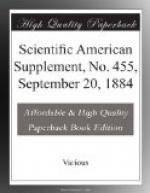The direct influence of rain on man is not very marked in this country, except by giving moisture to the air by evaporation from the ground and from vegetable life, and by altering the level of ground water. This is a subject almost overlooked by the public, and it is therefore as well that it should be known that when ground water has a level persistently less than five feet from the surface of the soil, the locality is usually unhealthy, and should not, if possible, be selected for a residence. Fluctuations in the level of ground water, especially if great and sudden, generally cause ill-health among the residents. Thus, Dr. Buchanan in his reports to the Privy Council in 1866-1867, showed that consumption (using the word in its most extended sense) is more prevalent in damp than on dry soils, and numerous reports of medical officers of health, and others, which have been published since then, show that an effective drainage of the land, and consequent carrying away of the ground water, has been followed by a diminution of these diseases.
Varying amounts of moisture in the air materially affect the health and comfort of man. In this country, however, it is not only the absolute but the relative proportions of aerial moisture which materially influence mankind. The quantity of aqueous vapor that a cubic foot of air can hold in suspension, when it is saturated, varies very much with the temperature. Thus at 40 degrees Fahr. it will hold 2.86 grains of water; at 50 degrees, 4.10 grains; at 60 degrees, 5.77 grains; at 70 degrees, 8.01 grains; and at 90 degrees as much as 14.85 grains. If saturation be represented by 100, more rapid evaporation from the skin will take place at 70 degrees, and 75 per cent. of saturation, than at 60 degrees when saturated, although the absolute quantity of moisture in the air is greater at the first named temperature than at the latter. As regards the lungs, however, the case is different, as the air breathed out is, if the respirations be regular and fairly deep, completely saturated with moisture at the temperature of the body. In cold climates the amount of moisture




